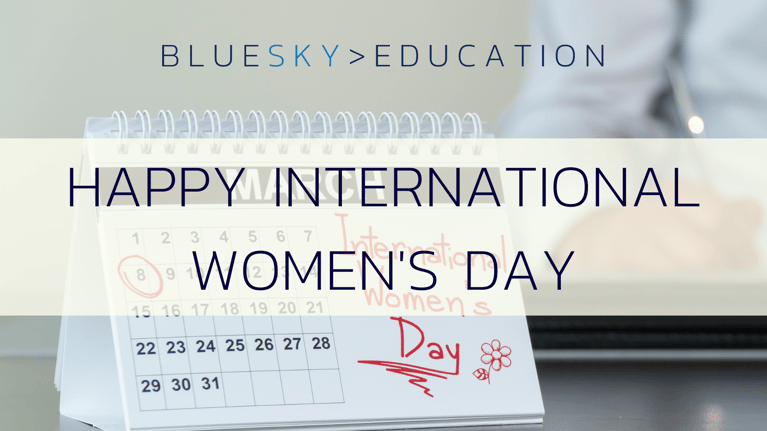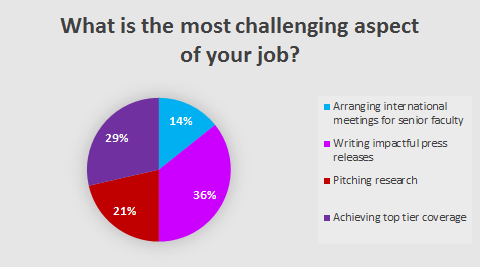
How to Communicate Diversity and Inclusion Initiatives in Today’s World
In today’s evolving corporate landscape, diversity and inclusion (D&I) are not just checkboxes, but fundamental elements of an organisation's success.

Harsh - but sometimes fair - opinions about press releases
Press releases can be one of the most effective communication tools. They’re a quick way to disseminate information widely to a targeted audience, and a well-written press release can demonstrate professionalism and credibility for your business school.

Unlocking effective media relations for professors
Academia and the media go hand in hand, and today business schools and universities are becoming increasingly aware of why engaging with the media is valuable for not only their professors, but also their institutions as a whole.

Why an effective PR plan is crucial for attracting potential students to your school
As universities and business schools around the world face an increasingly competitive recruitment environment, it’s vital that educational institutions continue to come up with creative and strategic ways in order to attract students.

How to communicate with and influence potential students
Students are at the heart of every business school or university. They are the future leaders of our society, and the drivers of change in many institutions. A university or business school’s success lies with the constant flow of eager, inspired, and motivated students. This is why it is essential that all communications teams know how to entice and influence potential students to their campuses and courses.

What business schools need to know about the APAC media landscape
For top international business schools, understanding the media landscape in various corners of the globe is key to securing top-tier press coverage in those regions. Business schools are home to thousands of international students and faculty, and produce ground-breaking research that can be of huge relevance all over the world. One region that has one of the most diverse array of cultures and one of the most varying media landscapes is the APAC region. Asia-Pacific (APAC) is the part of the world near the western Pacific Ocean. The Asia-Pacific region varies in area depending on context, but it generally includes East Asia, Russian Far East, South Asia, Southeast Asia, Australasia and Pacific Islands. Indeed, the APAC region is home to many business schools, and many higher education institutions outside of this region now have flourishing partnerships with schools within this area. It is therefore vital that any PR and communications teams working with partners in the APAC territory understand these differences and nuances to fully unlock APAC’s potential. Below, we highlight a few key trends in the media landscape in four key markets in East Asia – China, Hong Kong, South Korea and Taiwan.

We are more likely to remember a fact when it is part of a story
For centuries, humans have been telling stories as a way to connect – it’s in our nature. And today, stories are still at the centre of all that we do. From the stories we share with our friends at the weekend, to the anecdotes we tell our colleagues in the office, stories help us forge connections and build meaningful relationships, both personally and professionally.

What you need to know about niche communications
For many PR agencies, the instinct to run a firm that appeals to as many clients as possible through generalising their expertise is common. However, at BlueSky Education we believe that the most effective form of communications comes when you concentrate your efforts on defining your ‘niche’. In other words, we think that it is important to become an expert in your chosen industry – and in our case, that is business education.

How business schools and universities can use SEO content
In recent years Search Engine Optimisation (SEO) has become a term that we have all heard more and more. Indeed, SEO is an essential digital marketing tool that businesses benefit from massively, yet even if you have a basic understanding of what it involves, it is still hard to grasp just how effective it can be, and what makes good content/SEO.

Business schools are like companies and so benefit from media exposure
Today, there is more competition than ever between business schools as more and more are offering top-class programmes, innovative learning tools, and an extremely high-caliber of teaching. As such, international higher education markets are growing rapidly every year, which has indeed made the task of attracting leading academics and students more difficult than ever.

How to market Master's degrees taught in English
Today, master's degrees are surging in popularity, and the number of master's programmes on offer within business schools is growing every year, especially those taught in English.

PR Lessons learnt from Colin vs Cuthbert
We can all learn PR lessons from events we see in the news every day. From the prime minister to football managers, the potential for negative media attention is never far away. What is important however is how your organisation responds to this media, and how you turn scrutinised blunders into something positive.

International Women’s Day – What does it mean to BlueSky Education?
International Women's Day is a global day celebrating the social, economic, cultural and political achievements of women. Marked annually on March 8th, International Women's Day (IWD) is often seen as one of the most important days of the year to celebrate women's achievements, raise awareness about women's equality, and fundraise for female-focused charities.

What did BlueSky Education achieve throughout 2020?
2020 was an incredibly difficult year for many, but it's important to look at the positives and appreciate our achievements as well.

The benefits of digital PR in higher education
The early days of PR largely involved networking with journalists over the phone, face-to-face meetings, and building relationships with them in order to get companies, institutions and clients into newspapers and magazines. As such, prior to the internet, PR traditionally focused on print-based publications, TV and radio. But is it even PR now if we don’t include online media? With the growth of online marketing, the majority of PR professionals both in-house and in agencies today have shifted their focus further towards digital PR, with online publications becoming more and more influential.

What applicants search for when deciding on a university
Millions of students from across the world go into higher education each year, but with each selecting from thousands of universities and business schools around the world, it is vital that you understand what students are searching for when deciding on where to study, and how to get your school to stand out from the crowd.

How can business schools turn content into corporate partnerships?
Institutions can highlight their successful partnerships through PR activity – and attract new ones in the process Business schools are natural partners for many organisations, from big corporate companies to charities and non-profits. These partnerships work both ways – from the partner’s side of things, many organisations see partnering with business schools as an opportunity to give themselves an edge over the competition, as well as giving them access to some of the world’s best business talent of the future. From a business school perspective, big partnerships can bring successful internship opportunities for their students, international study trips, consulting projects as part of courses, and ultimately recruitment opportunities for their graduates. It is therefore essential that business schools highlight their successful partnerships through PR activity so they can not only showcase the fantastic work they are doing together, but to also attract further partners in the future, and potential students.

COVID-19 has increased the need for business school expert opinion
2020 has been the year of the expert, and this is because the global pandemic has increased the media and the public’s desire for academic and expert opinion to make sense of an unprecedented situation. As the world collectively comes to terms with the magnitude of Covid-19’s impact on all aspects of society, we all need something we can rely on – expert opinion and insight.

How business schools can use Twitter to maximise ROI from PR
Within the last 15 years, social media has completely infiltrated our lives – both personally and professionally. From a business perspective, it could be argued that Twitter is the most effective platform to engage with.

How to get coverage in political press
Political press is a broad branch of journalism, and every day we are infiltrated with political news – in print, on the TV, radio, and of course our digital devices. Indeed, the variety of political media outlets and publications reflect the huge variation of political opinion across the globe.

How to get coverage in finance press
Financial news outlets attract some of the biggest readerships and are amongst some of the most well respected in the world, with the Financial Times, Bloomberg, The Economist and Reuters amongst some of the most popular.

Why networking events are important in Business Education PR
Life is busy, and it’s very easy to come into work and go about your daily routine, Monday to Friday, sitting at the comfort of your desk. Drafting press releases, writing articles, and sifting through the vast amount of emails you may receive every day is time consuming, and it’s therefore understandable why you may ignore an invitation to a conference or networking event.

How to effectively work with media in the UK
The UK has a vast media landscape With a population of over 66 million, and over 100 daily and 450 non-daily newspapers, the UK is a nation of avid media consumers. Dating back to the 1620’s, the UK press has extensive history, and continues to be one of the most respected, diverse, and widely read national press across the globe.

How PRs should prepare for business education conferences
Business education conferences can be very productive, but they can be a stressful experience if you do not prepare properly.

Top PR challenges for business schools and universities
PR and communications teams within business schools and universities can face numerous challenges. However, there are a few hurdles that all PR teams across the board would resonate with.

Top 3 PR Quotes
Over a century ago Alvin Adams said: “Public relations are a key component of any operation in this day of instant communications and rightly inquisitive citizens.” Adams was an American businessman who pioneered express shipments by rail in the US – his words are as relevant today as they were then.
